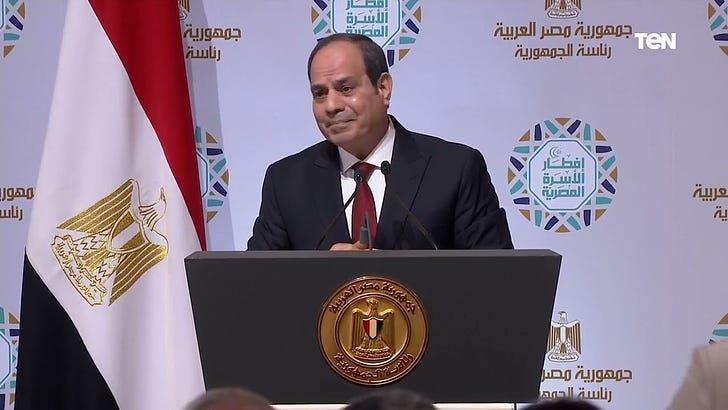In search of a civil society
Why is Egypt's dictator suddenly interested in a dialogue with the opposition?
In April of last year, President Abdel Fattah Sisi held the “Egyptian Family Breakfast” ⎯ that included regime officials, officers, politicians close to the security services, and others ⎯ to mark the end of the Muslim holy month of Ramadan.
The gathering was a surprise for many, since the guest list included a number of high profile opposition leaders, like the veteran Nasserist and former presidential contender, Hamdeen Sabbahi, and Khaled Dawood of the (quasi-liberal) Dustur Party who had been released from prison shortly before the event.
Sisi gave an hour-long speech, where he lashed out (as usual) against the 2011 revolution, blaming it for all the woes the country had been (and still) going through.
The autocrat appeared shaken, stressed out, as he tried desperately to present justifications for the economic crisis the country had plunged into. Yet his speech raised many eyebrows, when he declared the “Amnesty Committee” was to be reactivated, and called on the “political parties and forces” to hold a “national dialogue.”
The so-called Amnesty Committee had originally been launched in 2016, comprised of pro-regime parliamentarians and public figures. Their task simply consisted of drafting lists of pre-trial detainees and prisoners, whom they nominated for a “presidential pardon.” Once or twice a year, it was announced that a number of people had been released, and the local media (run in effect by the General Intelligence Service [GIS]) would celebrate and sing praises about Sisi’s kindness. Occasionally few high profile detainees indeed left prison due to those amnesty lists. Some were freed only to be rearrested. And on several occasions, the released included policemen indicted for torture and murder of citizens.
Still what surprised observers and citizens alike the most, in Sisi’s above-mentioned 2022 speech, was his declared intention to conduct a dialogue with the (non-Islamist) opposition. Why is the military dictator, whose approach to governance since 2013 has been carceral and lethal violence, suddenly interested in a “dialogue”?



